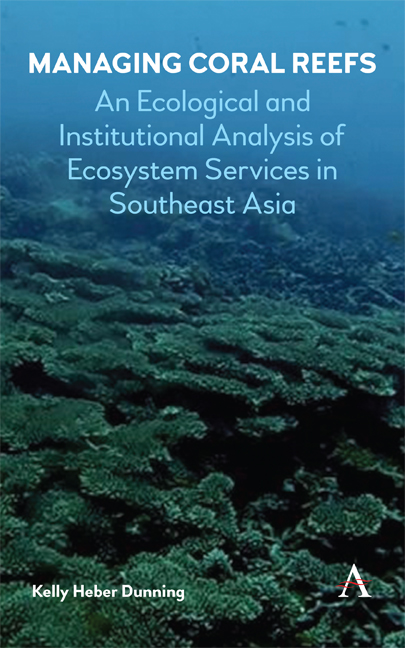 Managing Coral Reefs
Managing Coral Reefs Book contents
- Frontmatter
- Contents
- List of Figures
- List of Tables
- Acknowledgments
- List of Abbreviations
- 1 Introduction
- 2 Theory, Practice and Policy Context of Coral Reef Management
- 3 Governing Natural Resources in Indonesia and Malaysia
- 4 Case Study Sites and the Coral Triangle
- 5 Integrated Management of Marine Protected Areas
- 6 Legitimate Marine Protected Areas
- 7 Adaptive Capacity of Marine Protected Areas
- 8 Policy Recommendations for Marine Protected Area Management in Developing Countries
- Appendix A Research Design
- Appendix B Data and Methods
- Appendix C Coral Cover Results
- References
- Index
Appendix A - Research Design
Published online by Cambridge University Press: 16 August 2018
- Frontmatter
- Contents
- List of Figures
- List of Tables
- Acknowledgments
- List of Abbreviations
- 1 Introduction
- 2 Theory, Practice and Policy Context of Coral Reef Management
- 3 Governing Natural Resources in Indonesia and Malaysia
- 4 Case Study Sites and the Coral Triangle
- 5 Integrated Management of Marine Protected Areas
- 6 Legitimate Marine Protected Areas
- 7 Adaptive Capacity of Marine Protected Areas
- 8 Policy Recommendations for Marine Protected Area Management in Developing Countries
- Appendix A Research Design
- Appendix B Data and Methods
- Appendix C Coral Cover Results
- References
- Index
Summary
Overview
This research uses institutional theory in order to systematically define the analytical constructs of central and decentralized institutions, marine protected areas (MPAs), along the eight design principles described byOstrom. It also uses a socioecological systems framework to compare these institutions along specific criteria. Case sites were selected, or sampled, based on theoretical grounds, specifically on key “concepts, properties, dimensions, and variations” of sites (Corbin and Strauss 1990, 420). In other words, institutions were defined using the literature, differentiated between types and then different specific MPAs were studied. This research draws its design elements from grounded theorists Corbin and Strauss who argue that a project begins with researchers having an idea of a phenomenon they want to study—in this case top-down and bottom-up MPA institutions—then based on the idea, they select a group of MPA institutions to compare. Once in field sites, researchers are not sampling individuals; instead, they are sampling for “incidents, events or happenings” denoting in the case of this particular study local level strategies forMPA management across stakeholder groups (Corbin and Strauss 1990, 421).
Creating analytical constructs: Institutions
Institutional theory was critical in forming the analytic constructs of centralized and decentralized institutions. When designing my research, I divided it into two parts as defined by grounded theorists: the phenomenon and the interactions (Corbin and Strauss 1996). The phenomenon in this study is the institution, either top-down or bottom-up MPAs, whereas the interactions are described using a socioecological systems framework. Besides the more obvious criteria that federal government manages centralized institutions and local government manages decentralized institutions, the component parts of these phenomena had to be defined so that certain comparisons between Indonesian and Malaysian MPAs were systematic. This research design addresses the criticism commonly levied against co-management that it lacks systematic comparative analyses. Grounded theorists emphasize the importance of comparative analysis, arguing that it guards the researcher against bias; helps in achieving greater precision, whereby the original subjects (top-down and bottom-up MPA institutions) may be further subdivided; and helps in improving consistency of analysis (Corbin and Strauss 1990).
- Type
- Chapter
- Information
- Managing Coral ReefsAn Ecological and Institutional Analysis of Ecosystem Services in Southeast Asia, pp. 161 - 168Publisher: Anthem PressPrint publication year: 2018


